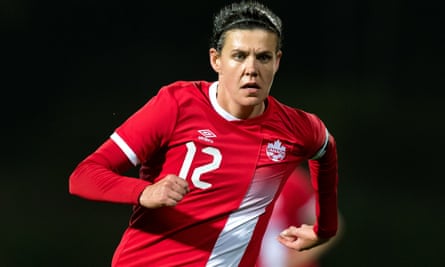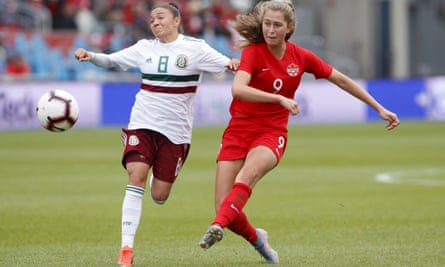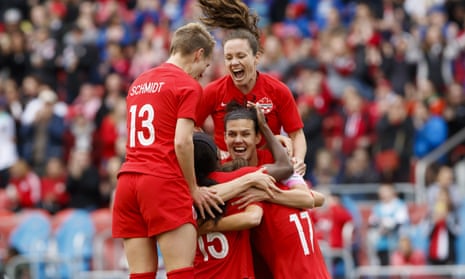This article is part of the Guardian’s 2019 Women’s World Cup Experts’ Network, a cooperation between some of the best media organisations from the 24 countries who have qualified for France. theguardian.com is running previews from two countries each day in the run-up to the tournament kicking off on 7 June.
Overview
Canada enter the World Cup as favourites to top Group E, but it won’t be a walk in the park for the team ranked No 5 in the world as they face Netherlands (the Euro 2017 champions), New Zealand (the Oceania champions), and Cameroon.
Christine Sinclair, as she closes in on Abby Wambach’s all-time goal scoring record of 184 goals, is the most important player in the squad and will have to lead the way. She heads into the World Cup having reached 180 goals and Canada’s success will be dependant on how far their captain can take them. If Sinclair gets the desired help from players such as Janine Beckie, Jordyn Huitema, Deanne Rose and Jessie Fleming, as well as the veterans Sophie Schmidt, Diana Matheson, and Desiree Scott, Canada have a great chance of going far in France. If not, they will struggle.
Canada are expected to line up in a 4-3-3 formation with the full-backs, Ashley Lawrence and Allysha Chapman, pushing forward. From that source, Canada will look to get balls into the box to Sinclair, Beckie and Rose and will look to use their aerial advantage. Kadeisha Buchanan is the rock that anchors Canada’s defence. The Lyon centre-back is brilliant at set-pieces at both ends of the pitch and has the speed, strength and ability to snuff out chances. Shelina Zadorsky and Rebecca Quinn are both in the frame to partner Buchanan in central defence.
If the team has a weakness, it is a lack of support for Sinclair up top. If Sinclair has to track back into the midfield to get the ball, it is going to be a short tournament for Canada. Sinclair’s teammates have to feed her the ball as in those games Sinclair has been isolated, Canada have struggled to get results against tier-one opposition. Canada have feasted on Concacaf minnows recently but have little to show in terms of results against the likes of the US, Germany, France, Sweden and the Netherlands. Kenneth Heiner-Møller’s team have to prove they can rise to the challenge and take on the best the world has to offer.
They say that defence wins championships, and Canada’s defence in preparation for the World Cup has been outstanding. In 2019, Canada have won four out of six (up to mid-May), with 1-0 wins over Norway, Scotland and England. Their defensive shape has helped earn them five clean sheets. The 32-year-old Steph Labbé will be Canada’s No 1 goalkeeper and Erin McLeod’s veteran presence and leadership could be a strong asset to a young Canada squad.
Coach
Kenneth Heiner-Møller took over from John Herdman in January last year. The 48-year-old previously managed his native Denmark from 2006 to 2013, and helped guide them to the semi-finals of Euro 2013. Heiner-Møller has not tinkered too much with Canada’s tactics – they still play a strong physical brand of football with the attack based around Sinclair.
Star player
Christine Sinclair will turn 36 on 12 June and, as she gets set to play in her fifth World Cup is showing no signs of slowing down. She can create space and score with ease. At the same time, she can also draw defenders in, which often leaves her teammates with space. Sinclair is a leader on and off the pitch, and she is the heart and soul of Canada.

Did you know?
Deanne Rose became the youngest ever goalscorer in the history of the women’s Olympic tournament when she scored as a 17-year-old in the third-place play-off against Brazil to ensure that Canada won the game 2-1. At the age of 16, she scored two goals on her debut against Guyana in an Olympic qualifier, prompting Sinclair to say: “Any time you can get a 16-year-old scoring for your country, it’s pretty cool.”
A brief history of women’s football in Canada
Women’s football in Canada does not have a long and illustrious history. They only played their first international game in 1986 and did not compete at the first official World Cup, in China in 1991, but they have been at every World Cup since, making France their seventh consecutive tournament. The biggest success so far came in 2003 when they finished fourth while they also reached the quarter-finals when they hosted the tournament four years ago. Their main claim to fame on the global stage has come at the Olympics where they earned back-to-back bronze medals at the 2012 and 2016 Games.
Which player is going to surprise everyone at the World Cup?
Jordyn Huitema could be a breakout star for Canada. The 18-year-old 5ft 11in striker is expected to join Paris Saint-Germain next season and is already showing a goal-scorers’ mentality with terrific power and finesse in front of goal.

What is the realistic aim for Canada and why?
There seems to be no doubt that Canada will emerge from Group E but whether they top that group remains to be seen. Netherlands, New Zealand, and Cameroon have all vastly improved and it will be up to Canada to show that they are more than just a team led by Sinclair. If opponents isolate Canada’s biggest threat, someone has to step up and deliver. They rode the momentum of playing at home in 2015 and it is difficult to see them progressing beyond the quarter-finals.
Number of registered female players
A 2018 annual report shows that there were 288,569 registered youth and senior women playing football in Canada.
Harjeet Johal writes for The Equalizer. Follow her on Twitter here.

Comments (…)
Sign in or create your Guardian account to join the discussion